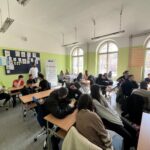
The National Qualification Framework in Serbia: Establishing a Common Language between Education and Labor
June 26, 2015 08:30 pm | June 26, 2015 02:00 pm
Hotel "Hyatt Regency Belgrade"
Belgrade, Serbia
Hyatt Regency Belgrade, Milentija Popovića, Belgrade
 The Conference titled The National Qualification Framework [1] in Serbia – Establishing a Common Language between Education and Labour is being jointly organized by the Belgrade Fund for Political Excellence and the Serbian Ministry of Education, Sports and Technological Development on June 26th in Belgrade.
The Conference titled The National Qualification Framework [1] in Serbia – Establishing a Common Language between Education and Labour is being jointly organized by the Belgrade Fund for Political Excellence and the Serbian Ministry of Education, Sports and Technological Development on June 26th in Belgrade.
The Conference takes place as part of the EU funded project supported through Erasmus+ program and implemented in a partnership between BFPE and the major stakeholders in Serbia relevant for the system of qualifications (the Ministry of Education; Serbian Chamber of Commerce; National Council of Higher Education and the Council for VET and Adult Education of the Republic of Serbia).
The aim of this Conference is to reach out to all relevant institutions/organizations as well as wider audience with the aim of promoting the importance of the NQF for social and economic development. In addition, this will also be an opportunity for the wider audience to become aware of the current endeavors in designing the NQF for Serbia, as well as the necessity of cooperation between different stakeholders and political support in the process of development and implementation of this key development instrument.
You can download the conference agenda HERE.
[1] The National Qualifications Framework is an instrument for aligning knowledge and skills acquired through formal, non-formal and informal learning. The knowledge becomes aligned into levels, however not based on the length and content of the educational program but on what the person with the fitting qualification knows and can do. The learning outcome descriptors are there to define what a person having qualification of a specific level should know and be able to perform and understand. Nationally defined descriptors enable the specificity of each national education system to be respected, and included in a system that corresponds to EQF in a suitable way. The focus shifted from the educational curriculum itself, its content and duration, to the user- the individual who acquires certain knowledge and skills (defined as outcomes of learning), in other words becomes qualified, by attending the program.
In Serbia, the communication string between education and labour market still rests on the idea of qualifications acquired in a formal way. This way the qualification information available is limited to the academic field and length of education, but no information whatsoever on competencies and specific tasks one is capable of performing.
Once it is made clear for what certain school certificates (degrees) enable the students to do, regardless of the institution that issued the degree, those students will automatically become workers, and that is, they cross on to the labor market. Right now, we are in a situation whereby a qualified, employable workforce is left over on the “education” side with a valid degree in their hands, however without the possibility to transfer to the work and employment sphere. In the same manner, once we identify qualifications necessary for successful performance of work assignments in a specific work place and once we uniformly define them, we will be able to plan both the educational curricula and personal career development easier. Read more.








